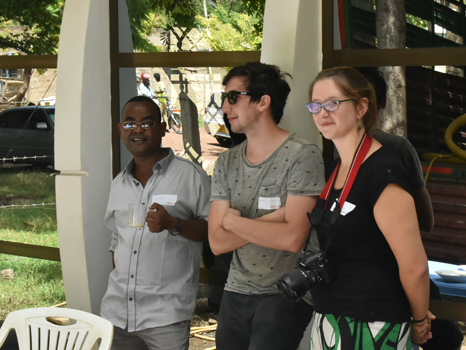 Work packages
Work packages

The project is organized around 4 work packages:
an in-depth literature survey of rapid assessment methods for carbon, water and biodiversity will be conducted.
The analysis will explore the main frameworks, tools, methods and valuation metrics and proxies for ecosystem services (ES) or most pertinent information enabling to assess it.
Literature about MAB sites and especially AfriMAB will be explored as an estimation of the importance of certain ecosystem services for the local stakeholders.
rapid assessment tools will be tested for application on 4 selected UNESCO-MAB sites.
These sites are chosen as a function of their representativeness for different ecosystems, biomes and relative weights of ecosystem services and stakeholders, as well as based on the track record of the consortium members to optimally capitalise on their expertise and existing networks and projects concerning these sites (see summary table on pg. 12).
It concerns Lake Manyara (Tanzania), Mount Elgon (Uganda), Pendjari National Park (Bénin) and Lake Tana (Ethiopia).
The work package is subdivided into the 3 clusters of assets analysed, being (B1) biodiversity and agro-biodiversity, (B2) hydrology, (B3) carbon storage. Sub-package B4 handles specifically on economic assessment of these asset clusters on the 4 sites.
The implementation of WP B will be carried out with the support of own (co-)funding from other projects: L. Manyara with a North South South VLIR-UOS project, Lake Tana with a starting 10 year VLIR-UOS Inter University Collaboration (IUC)-program, the ongoing 2013-2018 TEAM VLIR-UOS project 'SureLive' in the Mt Elgon area, Uganda and Pendjari National Park with CEBioS cooperation with Université d’Abomey-Calavi.
the results of WP B will be tested through a second round of multi-stakeholder workshops at the 4 sites, in order to validate them in the field (C1).
International experts’ opinions will be informing the validation phase through the application of the Delphi approach (C2).
A set of recommendations will be formulated for managers, decision- and policy makers (C3) and community leaders (through multi-stakeholder workshops and other multiplicator media such as radio, posters, social media).
It is obvious that local governance of the BR, end users, decision makers will be as much as possible involved in these workshops in order to:
(1) scope as much diversity of opinion as possible,
(2) inform in a capacity building mode as much target groups as possible and
(3) raise awareness, ownership and active involvement of the process with key players, creating a ‘critical mass’ of informed stakeholders which add motivation to national authorities and international donors to take action in specific management and governance decisions of MAB areas.
will play a crucial role for economic valuation.
In a first stage a range of so-called value transfer functions will be developed to support the rapid assessment of the 4 MAB sites.
In the rapid assessment willingness-to-pay data will be gathered and tested in the stakeholder workshops.
A rapid assessment will be made for the 4 sites using benefit transfer valuation and in addition a more in depth valuation using contingent valuation will be executed for Lake Tana (Wilson and Hoehn, 2006).
In the Lake Tana site the rapid assessment will be followed by slower, but higher quality methods through the VLIR IUC project in order to assess the quality of the rapid approaches.
This additional valuation exercise will also be used to test the robustness and to complement the benefit transfer valuation. In practice WP D will be applied through the different phases of WP. B and C.
Because of the importance of this work package, we invited no less than 3 experts in the field of ecological economics (1 partner and 2 optional partners) to complement the biological, ecological, biodiversity, hydrological and carbon stock expertise.
The valuation context will certainly very much influence the way the assessment is done. This should be conducive to formulate first recommendations to scenarios of reward mechanisms which could lead to PES systems.
 This site uses cookies in order to function as expected. By continuing, you are agreeing to our
This site uses cookies in order to function as expected. By continuing, you are agreeing to our 